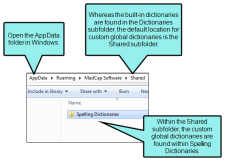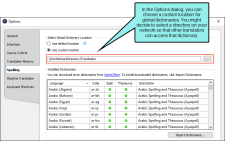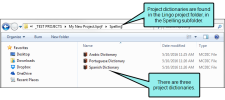In addition to all of the built-in dictionaries that are installed on your computer, you can develop custom dictionaries. You can think of these as supplements to the built-in dictionaries. A custom dictionary is created and modified automatically whenever you perform a spell check and tell Lingo that a questionable word is okay and should be added to a dictionary. See Spell Checking While Typing and Spell Checking Manually.
There are two kinds of custom dictionaries that you can use: global and project.
[Menu Proxy — Headings — Online — Depth3 ]
Global Dictionary
A global dictionary is a file that contains words and can be used for spell checking by any Lingo
By default, a new global dictionary is stored in your AppData folder, like all of your built-in dictionaries.
However, you can use the Spelling tab of the Options dialog (File > Options) to choose another location for your global dictionary.
You can also check the Thesaurus column in this dialog to see if your selected language supports it.
Project Dictionary
A project dictionary is just what it sounds like. It is unique to a particular project. When a project dictionary is created, it is saved in the Spelling folder of your Lingo project.
For example, you might choose to use this kind of dictionary if you are a translator with several clients, and each client has unique terms with unusual spellings. By using a project dictionary, you can keep those spellings tied to a certain project.



